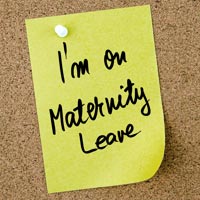
When women have a new baby, they will need to take time off work to give birth and to look after the newborn during their first weeks or more. It’s a precious time for both mother and baby and the good news is that employed mothers are legally entitled to maternity leave under UK employment law.  Today, we’ll take a look at how much time and money mothers are entitled to under Statutory Maternity Leave and what the eligibility requirements are. We’ll concentrate purely on the rules for mothers who are employees in this post. However, we will follow up to cover paternity leave, shared leave and support for self-employed mothers separately, in future guides.
Today, we’ll take a look at how much time and money mothers are entitled to under Statutory Maternity Leave and what the eligibility requirements are. We’ll concentrate purely on the rules for mothers who are employees in this post. However, we will follow up to cover paternity leave, shared leave and support for self-employed mothers separately, in future guides.
Statutory Maternity Leave Entitlement
Eligible mothers are entitled to take up to 52 weeks of Statutory Maternity Leave:
- The first 26 weeks (i.e. first 6 months), known as Ordinary Maternity Leave;
- The last 26 weeks (i.e. months 7 to 12), known as Additional Maternity Leave.
These are the statutory maximums, i.e. mothers do not need to take all 52 weeks off. However, they must take off the first 2 weeks from the date of birth as a minimum, or 4 weeks if they’re factory workers. (They can also arrange to share some of the remaining 50 weeks of their leave with their partner under Shared Parental Leave (‘SPL’) rules, which we’ll cover in the future).
Timing
Statutory Maternity Leave can begin up to 11 weeks prior to the baby’s anticipated due date. It must, however, begin no later than the day after birth if the baby is born early. For eligible mums, Statutory Maternity Leave (& Pay) must also start automatically in the event that the mum-to-be is off work for a medical illness, related to pregnancy, during the 4 weeks prior to the week the baby is due.
Eligibility
 The good news is that, to be eligible for Statutory Maternity Leave in the UK, just two main rules apply. You need to:
The good news is that, to be eligible for Statutory Maternity Leave in the UK, just two main rules apply. You need to:
a). officially be an employee of a company 1 and
b). give your employer the right amount of advanced notice.
How long you have been employed is not a factor and it also doesn’t matter what you are paid or how many hours you work.
1. Not a ‘worker’, ‘contractor’, ‘office holder’ nor ‘self-employed’ (like a sub-contractor) under UK employment tax law.
Notice should be given at least 15 weeks before the baby’s due date. The notice may need to be in writing, depending on your employer’s preference. It needs to confirm the baby’s likely due date and when you would like to begin the maternity leave. Once notified, your employer then has 28 days to officially confirm the beginning and end dates for that leave.
Statutory Maternity Pay (‘SMP’)
 Statutory Maternity Pay (‘SMP’) is available to mothers who:
Statutory Maternity Pay (‘SMP’) is available to mothers who:
- earn £120 minimum per week on average;
- have given their employer proof of pregnancy (usually an MATB1 certificate or letter from their doctor/midwife);
- have given their employer the correct notice (min. 28 days) of going on Statutory Maternity Leave;
- have worked for their employer for a minimum of 26 weeks (6 months) including into the 15th week preceding the anticipated due date;
- have not been in police custody during the SMP period.
Those whose income has dropped below an average of £120 per week due to being on furlough during the pandemic may still be eligible for SMP.
How Much Do You Get?
You can receive SMP for up to 39 weeks. For the first 6 weeks, you receive 90% of your average gross weekly earnings. For the remaining 33 weeks if you take them, you receive the lower of £151.97 per week, or 90% of your average gross weekly earnings. They’re paid to you from your employer with tax and National Insurance deducted as if they’re part of your usual wages or salary. (Figures correct at August 2021).
Your Employment Rights
When you are away from work on Statutory Maternity Leave, a number of statutory employment rights are still protected. These include your right to a possible pay rise, your right to accrue holiday leave and your right to return to work when your maternity leave comes to an end.
Company Maternity Schemes
Some employers have their own Maternity/Paternity schemes. These must be at least equal to the statutory leave and pay schemes, however, many offer even greater allowances and benefits. So, always check with your employer or HR department to see what may be available.
Try the Online Tool
 There’s a great online tool that you can use to check whether you are eligible to claim maternity/paternity leave and pay (as well as Maternity Allowance, which may help self-employed mums). It’ll also calculate how much you could receive. Head over to the Government tool here, ensure you have everything ready in the ‘Before you start’ section and click the green ‘Start now’ button.
There’s a great online tool that you can use to check whether you are eligible to claim maternity/paternity leave and pay (as well as Maternity Allowance, which may help self-employed mums). It’ll also calculate how much you could receive. Head over to the Government tool here, ensure you have everything ready in the ‘Before you start’ section and click the green ‘Start now’ button.
If You’re Not Eligible
If you’re not eligible for Statutory Maternity Leave or Pay, other Government help options may be available. For example, for the self-employed, those who have recently stopped working, or are receiving one or more benefits. Click the bold blue link for more details.
Unpaid Parental Leave
Did you know that it’s possible to take unpaid parental leave if your child is under 18? In fact, eligible employees are entitled to up to 18 weeks off work before their child reaches the age of 18. Rules apply, of course, including a maximum of 4 weeks of unpaid parental leave being allowed in any one year. We cover eligibility and the finer detail in a separate post, so click the bold link earlier in this paragraph for the complete picture.
Outstanding Childcare in Streatham, for Your Baby, Toddler or Under-5
 Are you looking for a high quality nursery in Streatham for your baby, toddler or under-five child? Little Cedars Day Nursery offers outstanding childcare in Streatham, close to Streatham Common, Streatham Hill, Streatham Park, Furzedown, Tooting, Tooting Bec, Tooting Common, Balham, Norbury & Colliers Wood. We’re one of the very best nurseries in SW16 and open on weekdays throughout the year. We’d love to show you and your little one around, so you can see the setting in action, and to answer any questions that you might have. Please select an option:
Are you looking for a high quality nursery in Streatham for your baby, toddler or under-five child? Little Cedars Day Nursery offers outstanding childcare in Streatham, close to Streatham Common, Streatham Hill, Streatham Park, Furzedown, Tooting, Tooting Bec, Tooting Common, Balham, Norbury & Colliers Wood. We’re one of the very best nurseries in SW16 and open on weekdays throughout the year. We’d love to show you and your little one around, so you can see the setting in action, and to answer any questions that you might have. Please select an option:

